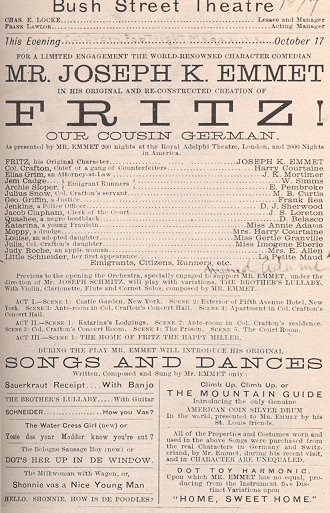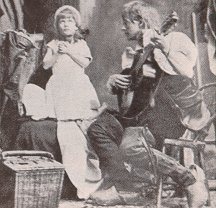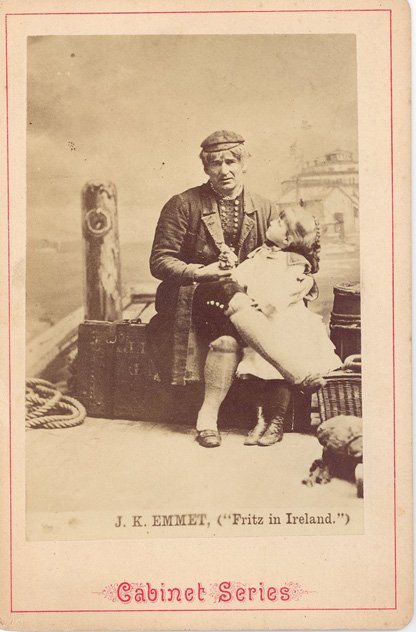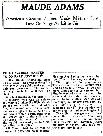
Fritz in Ireland

"..on October 17, 1877, one month shy of her fifth birthday, Maude launched her own professional acting career, appearing as Little Schneider in Joseph K. Emett's popular comedy, Fritz."" (Maude Adams, an American Idol: True Womanhood Triumphant in the Late-Nineteenth and Early-Twentieth Century Theatre, doctoral thesis, 1984, Eileen Karen Kuehnl)
=====From the book by Acton Davies=====
"She played the small boy, Little Schneider. She had nearly a hundred lines to speak in the play, but she memorized them in a couple of days, and on the first night was so completely letter perfect that Mr. Emmett congratulated her. There was one scene which worried her very much, however. In one act she had to be tied on a water-wheel, and unless she screamed at a certain instant the whole effect of the act would have been ruined. This fact was duly impressed on Maude by her mother at rehearsal, and Mrs. Adams in telling the story of that first performance says: " wish you could have seen Maudie that night. She was simply wriggling with excitement. It was all I could do to keep her in my dressing-room until the cue came for her to go on. She was most critical about her make-up, and after I had darkened her eyelashes and rouged her cheeks she turned to me very seriously and said, Muffer, are you sure I've got louge enough on ?' Just before the curtain went up I made her repeat her first-act lines to me. She had learned them like a parrot, to be sure, but she spoke them like a true little actress. I had explained the story of the play to her very carefully, and she seemed to grasp perfectly the important part which she was to play in the plot. The one thing that we were all nervous about was that mill wheel scene. I stood in the wings and watched her all through the first act. She really did splendidly. When the mill-wheel scene came I was on the stage too, and as the critical moment came nearer and nearer Maudie would whisper every other moment, ' Mufer, must I scweam now?'"
"Maude made a genuine success in Fritz, - so big a one, in fact, that Mr. Emmett began to bill her on the programme as "Little Maudie", and it was by that name that she was known out West throughout her career as a child actress."
=====American Musical Theatre: A Chronicle Book by Gerald Bordman; Oxford US, 1992=====
J. K. Emmet returned with a new Fritz play, Fritz in Ireland ( 11-3-79, Park). William Carleton's story was complicated and preposterous, leading up to the inevitable recognition scene. Baroness Hertford, feeling her husband ( J. H. Rennie) has never loved her, leaves her estate to her sister, Lady Amelia ( Lenore Bigelow), in case she dies before her child reaches maturity. Both she and the child do die, but the conniving Lawyer Priggins ( John Mackay) persuades the baron to kidnap and substitute another child, since the baroness' sister has never seen her niece. The blackmailing Priggins attempts to force the baron to assign his wealth to him. But the baron reminds Priggins of his suspicious actions when he was sent to seek Lord Seaton's lost son in Germany. The real son was to marry Lady Amelia. Of course, Priggins wanted to prevent the wedding. He was determined to marry Amelia himself, if the inheritance did finally fall into her hands. Years pass. Fritz arrives, seeking his kidnapped sister. In dialogue almost word for word from Fritz, Our Cousin German ( 7-11-70), the baron's "daughter" ( Emily Baker) responds to Fritz's singing an old lullaby:
Louisa : Oh, how beautiful!
Fritz : Dot song make you cry.
Louisa : The melody is so soft and sad.
The show marked no advance over the earlier Fritz efforts, and Emmet usually incorporated his by then famous "Lullaby" in the recognition scene. New songs included "The Bells Are Ringing," "The Cuckoo Song," and "The Love Of The Shamrock." This edition ran eight weeks and returned in May for an additional run. By this time, the shape of Emmet's future career seemed clear to him, and he was eager to convey his intentions to his audience. In the program for the Park Theatre for the week of November 14 he inserted a "Notice To Public." The notice ran, "It is Mr. EMMET'S intention to make an alteration yearly in his character of 'FRITZ,' by giving him sketches and incidents of his experience during his travels around the world, and introduce new scenes and music, making, if not an entire new drama, an entertainment not to be excelled." Possibly excluding the last value judgment, Emmet was true to his word. Emmet was plainly astute enough to gauge accurately his audiences' tastes, and he was determined enough never to veer from his stated plans. Even after his death, his son and others would be able to thrive for a number of years by rigidly following this 1879 dictum.


 Reno Evening Gazette, Jan. 14, 1908 |
 The Lima News, Nov. 11, 1926 |
Both of these are "after the fact" articles. This is, unfortunately, one of the plays that I have only been able to find a rather limited amount of material on. The first article really just refers to the fact that Maude Adams was in the play, whereas the second article has more specific information on it, the same type of material that was in Davies' book.
|